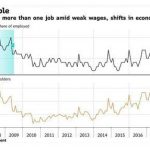Written by Brett Chatz, Intertrader
Emerging market currencies are feeling increasing pressure ahead of the upcoming two Fed meetings. An interest-rate hike would most certainly send EM currencies to their nadir.

EM Stocks Rally but EM Currencies Dip
The fate of emerging market economies is uncertain at best and dismal at worst. Emerging markets have a proclivity to contract when central banks in developed economies raise interest rates, or alternatively when the currencies of developed economies are strong. We have seen a sustained period of dollar strength coupled with EM currency weakness. This relationship is based on a multitude of factors which have synergistically combined to drive EM currencies further into the red. For starters, we have endured the worst performance to date on the Shanghai Composite index and the Shenzhen Index. That trillions of dollars were erased from equities markets has deeply impacted on emerging market economies around the world. Brazil, Russia, India, South Africa, Venezuela, Zambia and scores of other countries are reeling from the China meltdown.
Weak Demand and Oversupply Crushes Markets
What happened is all too familiar to market participants. We have witnessed a sharp reduction in global commodities demand spurred by weakness in the world’s second-largest economy – China. This in turn has resulted in decreased profitability, mass layoffs and the shuttering of mines. Even countries like Australia which are first world economies are suffering as a result of mining sector weakness. Low commodities prices mean that EM countries which rely on mining and agricultural production are now suffering. Worse yet is the capital flight taking place from EM countries to developed countries where the stability of the financial markets is preferred. It is the volatility of emerging market economies that acts as a deterrent to capital investment, and accelerates capital flight from those nations. In fact, all BRICS countries have suffered massive capital flight this year, and this trend is set to continue.














Leave A Comment